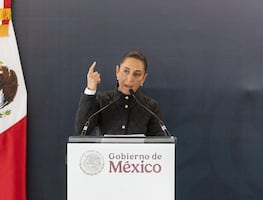Más Información

“Vamos a dar apoyo a los pequeños agricultores por sequía en Sonora”; Claudia Sheinbaum instruye a Berdegué

Derrota de México en disputa por maíz transgénico contra EU; estos son los argumentos de Sheinbaum y AMLO para prohibirlo

Óscar Rentería Schazarino, ha operado contra CJNG, Viagras y Templarios; es el nuevo secretario de Seguridad en Sinaloa

Claudia Sheinbaum pide respeto para Maru Campos; gobernadora anuncia acuerdo para transporte público

Claudia Sheinbaum anuncia los Centros de Cuidado Infantil en Chihuahua; inaugura hospital en Ciudad Juárez
U.S. President-elect Donald Trump's intervention to stop jobs at a plant in Indiana going to Mexico is typical of what happens in countries that Americans call "banana" republics, a senior Mexican state official said on Thursday.
Carrier, a unit of United Technologies Corp, said on Thursday that state officials had pledged $7 million in tax breaks to encourage the firm to keep around 1,100 jobs in Indianapolis after Trump stepped in to protect U.S. workers.
A heating and air-conditioning company, Carrier said in February it would cut some 2,100 jobs in closing two Indiana plants and move production near to the city of Monterrey in Nuevo Leon, a state bordering Texas in northern Mexico.
On the campaign trail, Trump criticized Carrier and other U.S. companies investing in Mexico as unpatriotic and threatened to impose tariffs on Mexican-made goods as part of his pledge to put "America first."
Trump's deal with Carrier created an "uncomfortable" situation for the company, and went beyond politicians' remit, Fernando Turner, economy minister for Nuevo Leon, said in an interview.
"It's not our job. It's up to companies to take their own decisions, not politicians; that's what's done in Latin American countries that they call banana (republics) in the United States," he said, laughing.
"It's not something that was done up until now in the United States. But anyway, things change."
Trump has threatened to abandon the North American Free Trade Agreement (NAFTA) between the United States, Canada and Mexico if he cannot renegotiate better terms for the U.S., arguing the agreement has hollowed out U.S. manufacturing to Mexico's benefit.
But Turner said that Mexico had not been a winner from NAFTA. The trade deal had both failed to lift Mexican economic growth and had cost the country millions of jobs, he argued.
Mexican economic growth averaged 2.6 percent in the 22 years since NAFTA took effect in 1994, compared with 2.5 percent for the far wealthier United States, according to World Bank data.
"(Trump) is sending a message to (U.S.) workers, to unions that they don't need to change, that everything is fine, that Mexico is the problem. But the problem is not Mexico," Turner added. "They're barking up the wrong tree."
Still, Turner said Trump was "intelligent" and his ambition to grow the U.S. economy would benefit Mexico if it came off.
"Trade between Mexico and the United States did not begin with NAFTA," he said.
(Additional reporting by Christine Murray; Editing by Dave Graham)





